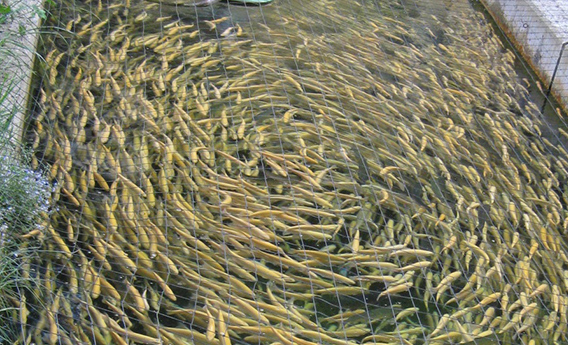Qualified for the catch
Traditional commercial fisher training updated
11/2016 | Bonn, 17.03.2016

Up early and off to work - commercial fishers need specialist knowledge in all weathers about which are the best fishing grounds, which fishing gear should be used inland and on the open seas, and how fish can be processed and marketed. On behalf of the Federal Government, and together with social partners and experts from company practice, the Federal Institute for Vocational Education and Training (BIBB) has now brought the three-year vocational training up to date in this centuries-old and specialised livestock sector. The updated training regulation delivers the skills and knowledge from the traditional content as well as in relation to technological developments and the increasing importance of food safety, environmental protection and customer requirements.
One of the key responsibilities of commercial fishers is the management of waters and fish stocks. Suit-able fishing methods and grounds are selected and fish are caught taking into account the habitat and life cycles, and requirements in terms of food, animal protection and health. The processing which follows, the traceability requirements for fish-related products as well as their marketing are also an element of the vocational education and training. Consumer protection, quality assurance and customer orientation represent key elements of the education and training content in this respect.
The education and training initially delivers overarching content and then focusses on one of the two specialisms, “Aquaculture and inland fishing” or “Inshore and small-scale deep sea fishing”. The former specialises in fish breeding, husbandry and feeding in fish farms. The use and maintenance of recircula-tion plants is a new topic in this area. The use of fishing gear according to the target fish species and its size is particularly important for the “Inshore and small-scale deep sea fishing” specialism. This also provides training on the use of navigation devices and nautical equipment, on safe conduct on board and on taking weather information into account for fishing trips.
The updated training regulation and the framework curriculum aligned with this, which has been de-veloped by the Standing Conference of the Ministers of Education and Cultural Affairs (KMK) for the school-based section of the dual vocational education and training, replaces the existing regulation from 1972. The new training regulation enters into force on 1 August 2016.
Overall, around 200 skilled workers are being trained nationally and the employment prospects are good. Commercial fishers are employed in fish husbandry, fish breeding, river and lake fisheries or on fishing vessels in sea fishing. They also work in public and research institutions as well as in commerce and in marketing. Following the education and training, the opportunity exists to take upgrading training leading to qualification as a master fisher.
Further information regarding the new “commercial fisher” training regulation is available at www.bibb.de/neue-berufe (German only)
Image material is available at www.bibb.de/pressefotos zur Verfügung.
Contact at the BIBB:
Markus Bretschneider
Specimen copy requested if printed.